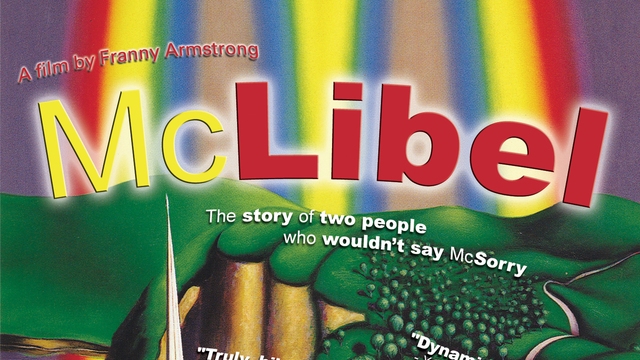McLibel
It was the biggest corporate disaster ever. Two penniless activists hauled McDonald's through the longest trial in English history, determined to defend their right to criticise the company. A gripping story.
 It was the biggest corporate disaster ever. Two penniless activists hauled McDonald's through the longest trial in English history, determined to defend their right to criticise the company. But that wasn't enough for the 'McLibel 2'. Next they took the British Government to court, arguing that the original trial was unfair because they were forced to defend themselves against the country's most expensive lawyers. Against all odds, they won! The UK's notorious libel laws will now have to be rewritten. Filmed over 11 years, by award-winning director Franny Armstrong, 'McLibel' is the definitive story of the case. This brand new film will be released theatrically in April, to coincide with McDonald's 50th birthday.
It was the biggest corporate disaster ever. Two penniless activists hauled McDonald's through the longest trial in English history, determined to defend their right to criticise the company. But that wasn't enough for the 'McLibel 2'. Next they took the British Government to court, arguing that the original trial was unfair because they were forced to defend themselves against the country's most expensive lawyers. Against all odds, they won! The UK's notorious libel laws will now have to be rewritten. Filmed over 11 years, by award-winning director Franny Armstrong, 'McLibel' is the definitive story of the case. This brand new film will be released theatrically in April, to coincide with McDonald's 50th birthday.
"It really began with one person - with Helen - saying "I can't apologise". Just one person saying "No, I won't bow down," recalls Eric Schlosser, best-selling author of 'Fast Food Nation'. In 1990, unemployed postman Dave Morris and barmaid Helen Steel were sued for libel by McDonald's after handing out leaflets criticising the company. Previously, any organisation that questioned McDonald's was forced to back down. Companies like Time Magazine, The Guardian and Channel 4 were all silenced by McDonald's multi-million dollar legal team. But Dave and Helen were different.
"If someone tries to make you do something which you don't believe in, then you have to stand up to them," spits Helen defiantly. "You've got to say "No, I'm not going to do it. I'm not going to give in to your intimidation and bullying." Despite facing infiltration by spies, secret meetings with corporate executives and 40,000 pages of background reading, Helen and Dave doggedly refused to back down. To them, defending their right to free speech was more important.
But under British law, they were denied legal aid. While McDonald's was represented by England's leading libel barrister and nine support lawyers, Helen and Dave were forced to defend themselves. The law also placed the whole burden of proof on the defendants. "The law in the UK favoured McDonald's and they were going to make use of it to the maximum," states Eric Schlosser. "Not to necessarily to bring these cases to trial but just to prevent the criticism from ever being made." The final die was cast when McDonald's succeeded in having the case tried in front of a judge instead of a jury.
After a long and protracted legal debate, McDonald's offered to settle out of court. But by now the McLibel Two were in too deep. "We're not going to let them off that easily, that's for sure," reads an entry in Helen's diary. Tactics such as sponsoring Dave's son's funday at a playcentre only served to fuel their resolve. "If they'd come up with something that protected the right to free speech and compensated those they'd sued in the past, we would have considered it," recalls Dave. "But there was really such a gulf between the two sides that they just couldn't bear to accept any of our demands." So the case went back to court.
The case became the longest running trial in British history. Dave and Helen managed to prove some of their claims. But other accusations in the leaflet were judged libellous and McDonald's were awarded £60,000. They never attempted to claim it. In February 2005, the European Court of Human rights declared their trial was unfair and awarded damages to the pair.
A true David and Goliath struggle, highlighting the abuse of corporate power.
FULL SYNOPSIS
